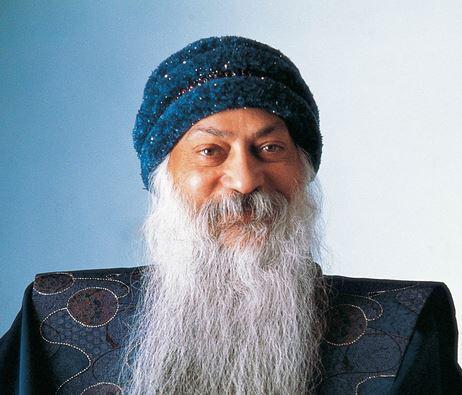Osho
Osho, born Rajneesh Chandra Mohan Jain (December 11, 1931 – January 19, 1990), was an Indian guru, spiritual teacher, and the founder of the spiritual movement known as Rajneeshism. He later adopted the name Osho, which means "one who loves life." Osho was one of the most controversial yet influential spiritual figures of the 20th century. His teachings combined Eastern mysticism with Western philosophy and psychology, emphasizing the importance of personal freedom, meditation, and living in the present moment.
Important milestones in his life
Osho was born in Kuchwada, a small village in central India. From a young age, he showed great interest in spiritual and philosophical questions and began to explore various religious and mystical traditions. He studied philosophy at university and became known for his critical and often provocative views on religion, politics, and society.
In the 1960s, he began working as a spiritual teacher and attracted a growing following. Osho criticized traditional religious institutions, which he considered dogmatic and hostile to life. He propagated a religion that would lead the individual to self-realization and inner peace without dependence on external authorities or traditional beliefs.
Central Teachings
Osho developed a unique philosophy that combined various spiritual and psychological currents. His most important themes include:
1. Meditation and Mindfulness: Osho emphasized that meditation is the path to enlightenment and inner peace. His meditation techniques, such as "Dynamic Meditation," incorporate active and physical elements (such as shouting, dancing, or breathing) to release suppressed emotions and calm the mind. These techniques were intended to help people release their inner blockages and enter the here and now.
2. Living in the Moment: A central theme in Osho's teachings was the importance of living in the present moment. He criticized the human tendency to dwell in the past or worry about the future instead of experiencing life in its full presence. Osho urged his followers to directly experience life's joys and challenges and not to be constrained by societal norms or fears.
3. Freedom and Individuality: Osho was a strong advocate of personal freedom and emphasized that true spiritual freedom could only be achieved by letting go of societal and cultural constraints. For him, the search for individual fulfillment was the true path to a fulfilling life. In his discourses, he encouraged his followers to make their own decisions rather than following blind faith or authority.
4. Love and Sexuality: Osho had an unorthodox view on the topics of love and sexuality. He didn't see sexuality as something unholy or dirty, but as a natural and important part of human life. In his view, love and sexuality should be experienced as expressions of joy and connection, not as a means of control or oppression. He called for liberation from moral and religious taboos and a freer, more conscious form of love.
5. Criticism of Religion and Society: Osho was a sharp critic of traditional religions, which he viewed as repressive and inhibiting individual freedom. He noted that most religions alienated people from their own divinity and obscured the truth through dogma and ritual. Osho emphasized that true spirituality is not defined by rituals or external authorities, but by direct personal experience.
The Rajneesh Movement
In the 1970s, Osho founded a commune in **Pune**, India, which served as a center for his teachings and meditation practices. The Osho International Meditation Resort remains a vibrant center for spiritual practice today and is sought out by many as a place of renewal and healing.
In the late 1970s, Osho and many of his followers moved to Oregon, USA, where he founded the so-called Rajneeshpuram commune. This commune was notorious for its strict hierarchy, luxurious facilities, and the controversial activities of its members, which drew criticism from both Osho and American society. The commune came into conflict with the local population and the US government when serious legal and ethical issues arose, including a poison gas attack planned by some followers.
This led to Osho's return to India in 1985.
Osho as a Philosopher and Teacher
Osho was a charismatic and provocative speaker who, in his lectures and books, shared profound, philosophical, and often humorous insights on topics such as love, meditation, freedom, and life in general. His conception of spirituality differed from many traditional approaches, as he advocated no fixed rules, rituals, or dogmas. Instead, he encouraged people to have their own experiences and find their own truth.
Osho combined elements from Western psychology, Buddhist teachings, Taoism, Hinduism, and Sufism to develop a universal philosophy focused on personal transformation and the awakening of consciousness.
Legacy and Influence
Osho left a far-reaching legacy. Today, his books have been translated into over 60 languages, and his meditation centers and retreats around the world have numerous followers. Despite his many critics and the controversies that accompanied his movement, Osho continues to enjoy a strong following.
His teachings on meditation, love, freedom, and living in the moment have helped many people develop a new understanding of spirituality based more on personal experience than on dogmatic belief systems. Osho understood how to encourage people to question themselves and seek their own truth, rather than passively conforming to predetermined religious or societal structures.
In summary, Osho is considered one of the most provocative and influential spiritual figures of the 20th century. His approach of combining spirituality and joy in life has inspired people worldwide to explore new paths of self-realization and inner growth
Links:
Osho: The Mystic Who Changed the Way We See Life, Love, and Spirituality
Free Reading: Tarot, Astrology and Numerology!





